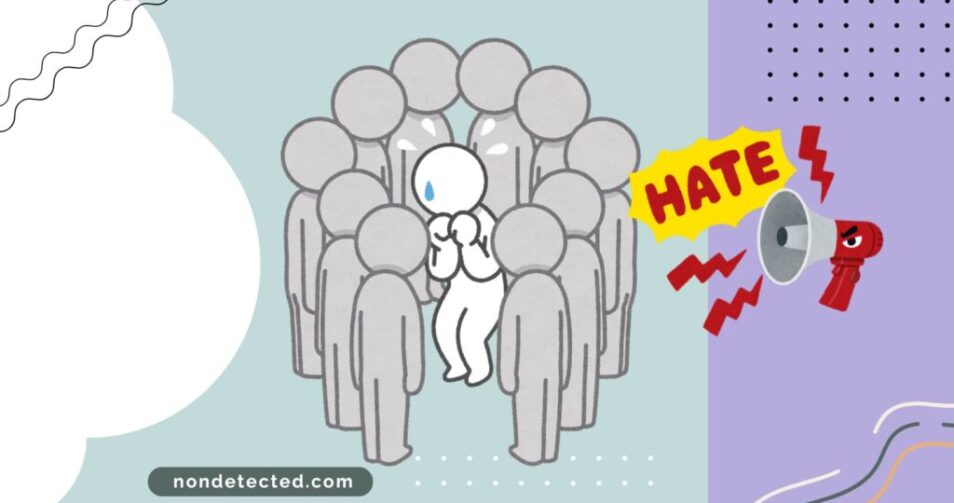What is Online Defamation? How to Deal with it?

Online defamation happens when someone makes a false statement of fact about you or your business online that damages your reputation. This can include harmful posts on social media, malicious online reviews, or misleading content that misrepresents the truth.
A defamatory statement can be written (libel) or spoken (slander), but the core issue is always the spread of false information that harms an individual or business.
In this read, I’ll explain what online defamation is and how you should fight back. Let’s begin.
Table of Contents
Is Defamation a False Statement of Fact? Or Something More?
Yes, defamation is more than just a false statement—it’s a false statement of fact that must be proven to cause harm.
For example, suppose a competitor falsely claims on a social media platform that your business engages in illegal activities. In that case, this tarnishes your reputation and can lead to lost business. Defamation claims are built on proving that these statements are untrue and have caused actual damage.
Impact on Individuals and Businesses
The impact of online defamation can be severe, leading to financial losses, emotional distress, and long-term damage to one’s personal or professional reputation.
Imagine a small business owner relying heavily on online reviews; a series of false statements in defamatory posts can result in a sharp drop in sales and customer trust and overal online reputation of a company.
Public figures often face defamatory remarks that can affect their careers, while businesses may struggle with ongoing internet defamation extortion, where attackers demand payment to remove negative content. Sometimes it can be a part of so called “black PR” or “black-hat PR”.
The consequences are far-reaching, making it essential to understand how to deal with online defamation cases and seek online defamation help when needed.
There is also another type of online defamation, but with focus on explicit content, called sextortion. You can check more information on this matter by following this link. Today we are going to focus on other types that will be covered later.
These examples highlight why protecting yourself against defamatory statements is crucial and illustrate the importance of legal action when someone tries to defame you.
Understanding what is considered a defamatory statement can be your first step in defending your reputation and fighting back against false claims.
Main Types of Defamation
Defamation takes two primary forms: slander (spoken) and libel (written).
Slander happens when false statements are spoken aloud, like in conversations, videos, or public speeches. As an example, saying “John stole money from his company” without evidence is slander.
Libel involves written defamation, such as online posts, reviews, or articles.
I guess this is the best time to provide you with real-life examples. Ready? Let’s begin.
Examples of Defamatory Statements
Here are some real-world examples of defamatory statements:
- Online Reviews. A customer writes, “This restaurant serves expired food, and the owner cheats on taxes!… And some other blah-blah-balh nonsense” without any proof. This allegedly defamatory statement harms the restaurant’s reputation and can lead to financial damage due to lost customers.
- Social Media Posts. A tweet that says, “Sarah is a scam artist who cons people into investing in fake projects.” nothing else, no proof, no anything. Such review or feedback can severely impact Sarah’s business and personal reputation, even if the claims are entirely untrue.
- Comments on Forums. Posting “Mike’s company manufactures faulty and dangerous products that could harm you” without evidence is another form of libel. Even if it’s just a comment on a forum, it can spread rapidly and lead to loss of trust and sales.
- False Accusations in the Workplace. If an employee tells colleagues, “The manager is stealing from the company,” without any proof, it’s a spoken defamation that could ruin the manager’s career and standing.
Understanding the types of defamatory content helps identify when to act. When false statements are made, whether written or spoken, they can have real consequences.
If you find yourself a target, seeking online defamation help, contacting an internet defamation attorney, or consulting with online internet defamation attorneys and defenders can be critical steps in protecting your reputation.
Consequences of Online Defamation
So, what are the main results or consequences of online social media defamation? Let’s find out.
Financial, Reputational, and Psychological Impacts
Online defamation can cause serious harm, affecting finances, a person’s emotional well-being, and professional life. When someone spreads a false statement of fact about you or your business, the effects can be devastating.
For instance, businesses often lose clients and revenue when defamatory statements are left unchecked, leading to long-term financial harm.
For individuals, defamatory content can destroy personal relationships, damage job prospects, and cause anxiety, depression, and stress due to the public nature of the attack.
Real-Life Examples from Our Experience
We’ve seen many cases where defamation claims have had significant impacts.
- One business owner came to us after a false review on a popular social media platform claimed, “This company scams its clients and sells defective products.” Sales dropped 40% in just a month.
- Another client, a public figure, faced internet defamation extortion, where an attacker demanded money to remove defamatory posts. After rejection, the attacker started review bombing, that also negatively impacted the online reputation of the client.
These are not just stories; they are real-life examples that show how damaging online defamation can be, often leaving victims feeling helpless.
It’s critical to understand these impacts and to act quickly. Working with online defamation defenders, seeking online defamation help, and knowing how to deal with defamatory statements can make a big difference.
Don’t wait until the damage is irreversible—take action to protect your reputation today.
How to Deal with Online Defamation?

Finally, we came to the part where I’ll share some practical tips on how to work against online defamation.
1. Contacting the Author/Source
Start by reaching out directly to the person who made the defamatory statement. Politely ask them to correct or remove the false statement. Many times, people are not aware of the harm they are causing and might be willing to make changes.
Steps:
- Find contact details of the person or entity responsible for the defamatory statement.
- Write a calm, professional message explaining why the statement is false and how it affects you.
- Politely ask for the statement to be removed or corrected. Provide evidence if available.
- If no response is received, send a gentle reminder after a few days.
Let me share some personal experience with you, a client of ours once faced a defamatory social media post falsely stating, “This business engages in unethical practices.” After contacting the poster, the content was removed without further conflict.
Even after the defamatory content is removed from the website where it was posted, search engines may continue showing cached links or archived versions. In these cases, professionals can help request removal or suppression of those lingering references—reducing the visibility of harmful material tied to your name.
2. Reporting to Hosting Platforms and Social Media
If contacting the author doesn’t work, the next step is to report the content to the platform where it was published. Most social media platforms and websites have policies against defamatory posts.
Submit a detailed report explaining why the content is false and how it violates the platform’s guidelines.
Steps:
- Most platforms have a report button near posts or comments.
- Clearly explain why the content is false, referencing the platform’s guidelines.
- Attach any supporting documents or screenshots that prove the statement is false.
- Keep track of your submission and follow up if necessary.
For example, we helped a business owner report a false review to a major social media platform, starting with “F” ending with “K”…if you know what I mean, which led to the removal of the defamatory statement within days or maybe week.
3. Rebuttals and PR Management
Sometimes, addressing false claims publicly can help set the record straight. Craft a clear, factual rebuttal that calmly explains the truth without attacking the person who made the defamatory comments.
Steps:
- Draft a clear, factual rebuttal that addresses the false claims without personal attacks.
- Use your website, social media accounts, or other public platforms to share your response.
- Respond to comments calmly and avoid getting drawn into arguments.
- Keep an eye on public responses and adjust your strategy if needed.
This approach is particularly effective in cases of cyber libel where online defamation help is needed to control the narrative.
4. Other Options
If you did everything from the above and none of these steps resolved the issue, you may consider legal options such as sending a cease-and-desist letter or filing a defamation lawsuit.
Consulting with an Internet defamation attorney can help you understand your rights and the potential legal actions that can be taken to complete a defamation claim according to your local laws.
Steps:
- Consult an attorney to draft a cease-and-desist letter demanding the removal of defamatory content.
- If the issue persists, discuss filing defamation lawsuits or a defamation claim with a legal professional.
- Collect all defamatory statements, communications, and other evidence that can prove online defamation.
- Engage with internet defamation attorneys who specialize in such cases to guide you through the legal process.
Legal professionals can provide guidance on how to prove online defamation and protect your reputation.
Keep in mind that the key is to take action quickly and carefully to lessen the harm that defamatory statements cause.
NonDetected – Your Online Defamation Defenders
If you’re dealing with online defamation, you don’t have to face it alone. At NonDetected, we specialize in protecting your reputation when someone tries to defame you online. Whether it’s a damaging social media post, false reviews, or internet defamation extortion, we have the expertise to help, following a defamation law in your region.
Defamatory statements often include personal identifiers. If your private details are exposed alongside false claims, getting that data removed from aggregator sites and directories can reduce risk and lower the chance of further harm. Help is available to tackle these leaks at the source.
Our team of online defamation defenders works closely with individuals and businesses to remove defamatory statements and restore their reputation.
Why Choose NonDetected?
We’ve helped countless clients regain control over their online image, using proven strategies tailored to each unique case. From managing defamation claims to working with internet service providers and social media platforms, we know how to fight with online defamation effectively.
Contact us today for a free consultation and let us be your trusted partner in fighting defamatory content. Your reputation is our priority, and we’re here to defend it every step of the way.
Prevention Strategies
Now, let me provide you with some strategies to prevent online defamation.
1. Reputation Monitoring Tools
Staying aware of what’s being said about you or your business online is crucial. Reputation monitoring tools like Google Alerts, Mention, and Brand24 can notify you whenever your name, business, or keywords related to your brand appear online.
This allows you to respond quickly to any false or untrue statements or defamatory posts before they spread further.
Another example can be a business owner who once caught a defamatory comment early on through monitoring and addressed it promptly, preventing a potential reputational crisis.
2. Proactive Reputation Management
Proactive management means creating and maintaining a positive online presence before problems arise. This includes regularly updating your social media accounts, sharing positive content, and engaging with your audience.
Building a strong, positive online image makes it harder for false claims to damage your reputation. A client who consistently shared helpful and engaging content found that when defamatory remarks were made, their loyal followers defended them, minimizing the impact.
Using these strategies, you can prevent online defamation and build a resilient online presence that withstands attacks. If you find yourself targeted by defamatory statements, seeking online defamation help from professionals can further protect your online reputation too.
Final Words
Online defamation can happen to anyone, and its impact can be overwhelming. The key is to act quickly and stay informed. Monitor your online presence regularly with reputation monitoring tools to catch defamatory statements early.
If you encounter libelous statements, contact the author, report the content, and seek online defamation help from professionals who can guide you through defamation claims and possible legal actions.
And don’t you forget, you’re not alone in this. Taking proactive steps today can protect your reputation tomorrow.
If you need assistance, don’t hesitate to contact experts who specialize in handling defamatory content and online threats. Your reputation is worth defending.


